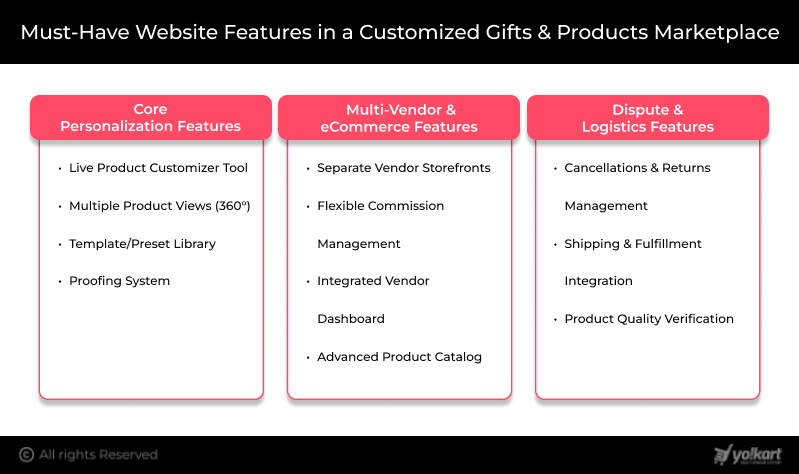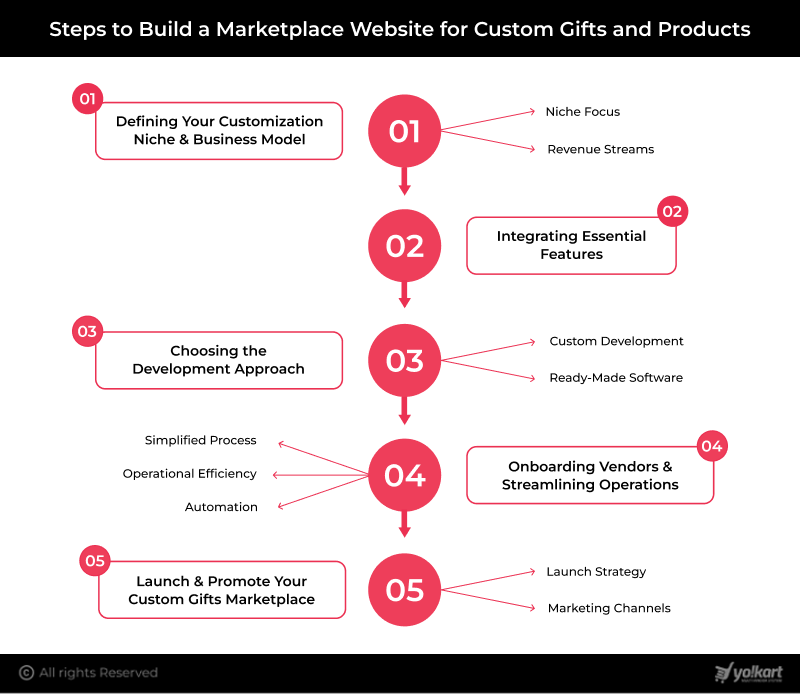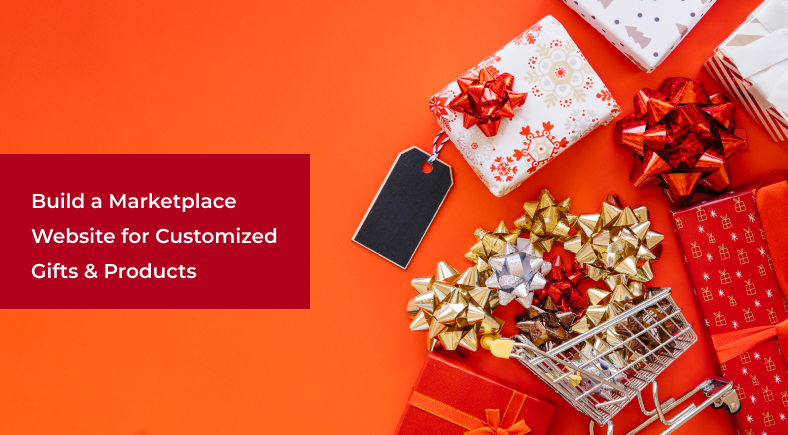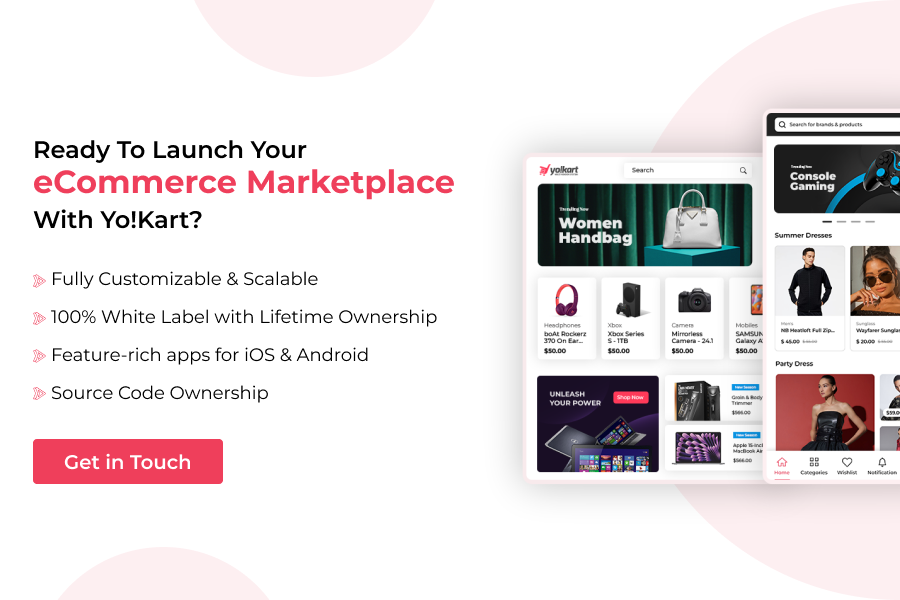The modern consumer is moving past mass-produced goods. In an era defined by personal expression, the demand for unique, thoughtful, personalized gifts and custom products has exploded. This shift has created an immense opportunity for savvy entrepreneurs to launch a multi-vendor marketplace website for customized gifts and products, the digital equivalent of a high-end, bespoke craft fair.
In that regard, this comprehensive blog is crafted specifically for the ambitious founder looking to capitalize on this trend. Moreover, you will explore the market potential, essential features, and lay out the practical steps, focusing on the approaches to build a thriving online marketplace for customized gifts and products.
Table of Contents
- What is a Customized Gifts & Products Marketplace?
- Understanding the Business Model: Key Trends
- Top Products to Sell for Personalized Gifts & Custom Products
- Must-Have Website Features in a Customized Gifts & Products Marketplace
- Steps to Build a Marketplace Website for Custom Gifts and Products
- Yo!Kart: eCommerce Marketplace Software Solution
- Conclusion
- FAQs
What is a Customized Gifts & Products Marketplace?
A customized gifts & products marketplace is an eCommerce platform that connects multiple independent sellers, such as artisans, small businesses, and print-on-demand providers, with buyers seeking unique, personalized items.
Unlike a single-vendor store that sells its own customized goods, a multi-vendor marketplace acts as a facilitator, connecting sellers and buyers. It manages transactions, commissions, seller onboarding, and provides the essential tools for vendors. Moreover, the platform offers a wide array of products, from engraved jewelry to custom-printed apparel, which the buyer can personalize before purchase using on-site design tools.
This model shifts the heavy lifting of inventory and production to the vendors, allowing the marketplace owner to focus on growth, marketing, and platform management.
Further, let’s understand the business models and ongoing trends in the industry.
Understanding the Business Model: Key Trends
The personalized gifts market is not just a trend but a rapidly growing segment of the global economy, demonstrating significant resilience and opportunity. Let’s have a look at the growing numbers of this industry:
Market Growth and Projections
The personalized gifts market is experiencing robust growth, driven primarily by eCommerce. Projections by Market Research Future indicate that the global market size is set to reach $ 53,948.50 million by 2032, growing at a CAGR of 6.5% from 2024 to 2032. Furthermore, the online distribution channel is the largest segment, underscoring that digital marketplaces are the primary vehicle for this growth.
Key Market Drivers:
- Search for Emotional Value: Consumers are increasingly seeking gifts that convey emotional significance and a deeper connection, which personalization inherently provides.
- Technological Advancement: Easy-to-use digital printing, laser etching, 3D printing, and sophisticated online design tools have made customization scalable and affordable for small businesses.
- Influence of eCommerce and Social Media: Platforms like Instagram and Pinterest fuel demand by showcasing unique, one-of-a-kind items, driving consumers directly to online marketplaces to find or create similar products.
- Non-Photo Segment Dominance: While photo gifts remain popular, the non-photo segment, including personalized text/monograms on apparel, jewelry, kitchenware, and accessories, is expected to maintain the largest market share, indicating a broad scope for product categories.
The multi-vendor model is perfectly positioned to capture this market by offering the breadth of variety and the specific niche focus that single-brand stores cannot match.
Have a Unique Business Idea in Mind?
Top Products to Sell for Personalized Gifts & Custom Products
To ensure a diverse and high-conversion marketplace, focus on products that offer high potential for personalization across various price points and occasions. Given below are some of the products:
| Category | Product Examples | Customization Types |
| Apparel & Accessories | T-shirtsHoodiesHatsTote bagsSocksCustom patches. | Print-on-Demand (DTG/Screen)EmbroideryVinyl Heat Press. |
| Home Décor & Kitchenware | MugsTumblersEngraved cutting boardsCustom door matsThrow pillows. | Sublimation printingLaser EngravingMonogrammingVinyl Decals. |
| Jewelry & Keepsakes | Engraved necklaces (names/dates)Custom soundwave artFingerprint jewelryPhoto lockets. | Laser EngravingMetal Stamping3D PrintingResin Casting. |
| Stationery & Office | Personalized plannersCustom notebooksEmbossed leather goodsPhoto calendars. | EmbossingFoil StampingDigital PrintingDie-Cut Stickers. |
| Pet Accessories | Engraved pet tagsCustom-printed pet bowlsPersonalized dog beds. | EngravingEmbroiderySublimation Printing. |
Pro Tip: Beyond the product itself, encourage vendors to offer personalized packaging (custom labels, wax seals, personalized notes) as this significantly elevates the perceived value and customer experience.
Must-Have Website Features in a Customized Gifts & Products Marketplace
Building a customization-focused marketplace requires a feature set that goes beyond a standard eCommerce platform. To stand out in this competitive landscape, your platform should include essential and advanced features and provide an intuitive and secure user experience for both the buyer and the seller. Hence, some of the must-have features are mentioned below:

Core Personalization Features
- Live Product Customizer Tool: This is the most critical feature. It allows buyers to upload images, input text, select fonts, adjust colors, and preview their design in real-time on products like mugs, T-shirts, phone cases, or cushions before buying.
- Multiple Product Views (360°): Especially for complex items like jewelry or apparel, the platform must support high-quality images and 360-degree views to showcase the customization from all angles.
- Template/Preset Library: Vendors should be able to upload pre-designed templates, such as Mother’s Day Template, Wedding Invitation Layout, and more, that buyers can simply fill in with their text or photo, simplifying the process.
- Proofing System: A workflow where the buyer can approve a final design proof before the vendor begins production. This mitigates returns and cancellations.
Multi-Vendor & eCommerce Features
- Separate Vendor Storefronts: Each seller should have a dedicated, branded micro-store within the marketplace to build their brand and customer base.
- Flexible Commission Management: The admin or marketplace owner must be able to set different commission rates for different product categories or vendor tiers.
- Integrated Vendor Dashboard: A centralized control panel for sellers to manage inventory, product listings, orders, shipping rates, and payout requests.
- Advanced Product Catalog: The ability to handle complex product variations, such as size, color, and material, combined with personalization options, including engraving font or text input field.
Dispute and Logistics Features
- Cancellations & Returns Management: A clear system for managing the returns and cancellations specific to personalized products, which are typically non-refundable unless the error is the vendor’s.
- Shipping & Fulfillment Integration: Tools to allow vendors to easily integrate with major shipping carriers and offer customizable shipping zones and prices.
- Product Quality Verification: A process for the admin to approve a vendor’s product listing, especially the complexity of their customization options, before it goes live.
Build a Future-Proof Marketplace Website for Customized Gifts & Products
Steps to Build a Marketplace Website for Custom Gifts and Products
Launching a successful marketplace starts with defining your core offerings and choosing the right technology. To make the process easier, we’ve broken it down into clear, actionable steps to guide you from concept to launch.

Step 1: Defining Your Customization Niche and Business Model
- Niche Focus: Focus on a specific niche like Customized Jewelry (high emotional value, 3x-4x margin) or Custom Apparel & T-Shirts (high volume, 40% margin). A narrow focus simplifies marketing.
- Revenue Streams: Determine a sustainable monetization mix:
- Commission-Based Model: A percentage cut on every sale (e.g., 8-15%).
- Subscription/Membership Fees: Recurring fees for vendor access to premium tools.
- Featured Listings: Paid promotions for vendor visibility.
Step 2: Integrating Essential Features
Once you select the right platform, ensure a seamless user experience by incorporating key features, such as advanced search and filters, secure multi-payment gateways, reviews and ratings, mobile responsiveness, wishlists, vendor dashboards with inventory management, and an efficient dispute resolution system.
Step 3: Choosing the Development Approach
Building a core platform that handles complex customization requires careful consideration of the two primary approaches: Custom Development and Ready-Made Software.
Approach A: Custom Development
This approach involves building the entire platform and the required real-time design from scratch. This strategy offers the ability to create a truly unique, pixel-perfect user experience and proprietary customization tools. However, it requires a significant commitment of time and resources.
- Platform Scope: Building multi-vendor features like commission management, separate vendor dashboards, and all compliance tools from the ground up.
- Timeline and Cost: Custom development often involves high initial costs and a lengthy timeline, typically exceeding nine months.
- Dependency: This approach carries high long-term technical debt and relies heavily on a small, specific development team for maintenance and updates.
Approach B: Ready-Made Software (e.g., Yo!Kart)
This approach involves utilizing a robust, pre-built eCommerce marketplace software that is already engineered for a multi-vendor environment.
- Platform Scope: Ready-made solutions come pre-packaged with essential, non-negotiable marketplace features, such as vendor approval workflows, tax management, multi-currency support, and sophisticated admin control panels.
- Focus: Because the complex multi-vendor infrastructure is already proven, the focus shifts immediately to configuring the platform and integrating or utilizing a robust product designer add-on.
- Benefits: This strategy drastically cuts time-to-market, lowers initial investment, and provides a stable, scalable foundation, making it the more efficient starting point for ambitious founders.
Step 4: Onboarding Vendors and Streamlining Operations
The success of a marketplace depends heavily on reliable and high-quality vendors. Streamlining the vendor onboarding process ensures that sellers can start listing products quickly while maintaining consistent quality standards. For this,
- Simplified Process: Create a simple registration process with clear quality guidelines and product standards.
- Operational Efficiency: Integrate a robust vendor management system that allows the admin to approve sellers, monitor product listings, and maintain consistent quality across the marketplace.
- Automation: Use built-in order management and automated payout systems to simplify logistics and vendor accounting, saving time and reducing manual errors.
Step 5: Launch and Promote Your Custom Gifts Marketplace
Launching the marketplace is just the beginning. Effective marketing strategies are crucial to attract both buyers and vendors, while continuous optimization ensures your platform remains competitive and user-friendly. Hence, you should:
- Launch Strategy: Begin with a soft launch to test user experience, followed by a full-scale launch with targeted marketing campaigns.
- Marketing Channels: Utilize SEO, social media ads, influencer partnerships, and email campaigns to reach both buyers and sellers. Building a successful custom gifts marketplace requires a clear niche, a scalable platform, essential features, smooth vendor operations, and ongoing marketing. Following these steps ensures a seamless, engaging, and profitable marketplace ready for growth and long-term customer loyalty.
A successful custom gifts marketplace thrives on creativity, trust, and technology. By empowering vendors and simplifying personalization, you create more than just a sales platform. You deliver personalized experiences that resonate with customers, turning every order into a meaningful exchange and positioning your brand as a leader in customized gifting. That being said, let’s have a look at a versatile solution that you can leverage to build a marketplace website for customized gifts & products.
Yo!Kart: eCommerce Marketplace Software Solution
Yo!Kart is a specialized, multi-vendor eCommerce marketplace software ideal for launching a customized gifts and products marketplace. It operates on a one-time license fee model, making it an appealing choice for entrepreneurs seeking a robust, scalable foundation without recurring per-vendor fees common to other platforms. Furthermore, Yo!Kart provides a robust foundation with an essential suite of features like vendor dashboards, product management tools, secure payments, and mobile responsiveness. Additionally, for customization-based businesses, it can support product personalization options, custom product attributes, and third-party integrations for design tools or printing APIs. With its flexibility, Yo!Kart enables entrepreneurs to easily create a user-friendly, secure, and high-performing platform tailored to personalized shopping experiences.
Challenges in Running a Custom Gifts Marketplace & How Yo!Kart Solves Them
Running a multi-vendor marketplace for customized gifts and products comes with unique operational challenges that go far beyond standard eCommerce setups. Since every item is made on order, maintaining quality, managing logistics, resolving disputes, and ensuring accurate payouts can quickly become complex. That’s where Yo!Kart comes in as it is purpose-built to address these challenges with intelligent systems and automation that enhance reliability and efficiency.
| Challenge | Yo!Kart Solution & Advantage |
| Quality & Standardization:Variations in materials, print quality, or sizing across vendors can harm brand trust. | Centralized Quality Vetting: The user management system allows the admin to oversee and monitor seller profiles and product listings on the platform. If any issues are found during quality checks or listings do not meet quality standards, the admin can immediately take action on the same, ensuring consistent quality and standardized product information. |
| Logistical Complexity:Late deliveries are common with custom products. | Advanced Order Management: The platform provides a transparent, granular order flow. The admin can track order status from “Design Approved” to “In Production” to “Shipped” for every vendor, allowing for proactive identification and penalty/suspension of vendors with persistent delays. |
| Dispute Resolution:Personalized items are often non-refundable, leading to disputes when customers claim errors. | Built-in Dispute/Grievance System: Yo!Kart includes a robust Dispute Management System that acts as a neutral third-party mediator. This system allows all parties to upload evidence (e.g., the final design proof confirmed by the customer), enabling the admin to make a fair, evidence-based decision that protects the vendor’s no-refund policy on personalized items. |
| Vendor Payout & Tax:Managing commissions, taxes, and payouts for multiple vendors can be daunting. | Integrated Accounting & Tax Modules: Features like an in-built accounting system automate the calculation and deduction of taxes and commissions before the payout is made. This simplifies global compliance and ensures prompt, accurate payment to your vendors, boosting retention. |
By combining automation, transparency, and administrative control, Yo!Kart empowers entrepreneurs to efficiently run a thriving, trustworthy marketplace for customized gifts and products.
Book a Free One-on-One Demo to Know More About Yo!Kart
Conclusion
The personalized gifts and custom products market is a high-growth, high-margin niche waiting to be dominated by curated, focused players. However, success hinges not just on having great vendors, but on a robust technical foundation that can handle the unique complexity of real-time customization and non-standard returns.
Thus, by choosing a mature, ready-made software solution like Yo!Kart, entrepreneurs can bypass the months and hundreds of thousands of dollars required for custom development, securing a competitive advantage with a faster time-to-market. The future of gifting is bespoke; now is the time to build the digital infrastructure to support it.
FAQs
Q 1. How much time does it take to launch a marketplace website with a ready-made software solution?
Ans. Although the time taken to launch a marketplace website varies depending on the customization, a ready-made multi-vendor software solution drastically accelerates time-to-market with its pre-built modules.
- Basic Launch (MVP): For a basic version with default design and core features, you can launch your marketplace in as little as 1-2 weeks (5-10 working days). This assumes you use the platform’s default theme and minimal customizations.
- Full-Featured Launch (Branded): For a professional launch that includes full branding, custom design for 5-9 pages, integration of a product design tool, and payment gateway setup, the timeline is typically 8-12 weeks (50-60 working days).
Q 2. How much does it cost to build a customized gifts and products website with Yo!Kart?
Ans. Yo!Kart operates on a one-time license fee model. Hence, no recurring transaction fees or monthly subscriptions, which makes it highly cost-effective compared to SaaS models in the long run.
- Starting Price (Self-Hosted, Lifetime License): The basic package offered by Yo!Kart starts around $999 – $1,499 for a lifetime license with all standard features.
- Recommended Package (GoQuick Boost): A more robust package, which usually includes the web application, buyer mobile apps (Android & iOS), and 12 months of free technical support, is typically priced around $3,997 – $5,000.
- Customization: Custom design and feature additions (like an integrated, advanced product designer tool) will incur additional costs.
Q 3. What are the top marketplace websites for personalized gifts & products?
Ans. While your marketplace should aim for a niche, you should study the industry leaders to understand best practices for customization, vendor management, and product presentation. Hence, some of the top marketplace websites for personalized gifts & products are mentioned below:
- Etsy: The undisputed global leader in handmade and vintage goods. Etsy’s vast scale means a massive selection of personalized items, often involving direct communication between buyer and seller for the customization details.
- Amazon Handmade: Amazon’s curated section for artisans and handmade goods. It offers a massive audience but has stricter rules on what qualifies as “handmade.”
- Zazzle & Redbubble: These are more focused on Print-on-Demand (POD). Artists upload designs, and the platform/vendor prints them on products (mugs, t-shirts, etc.) as ordered. They specialize in mass customization of design.
- Not On The High Street (UK-focused): An excellent example of a curated, high-quality marketplace that focuses heavily on unique, personalized, and luxury gifts, providing a model for a premium niche.




